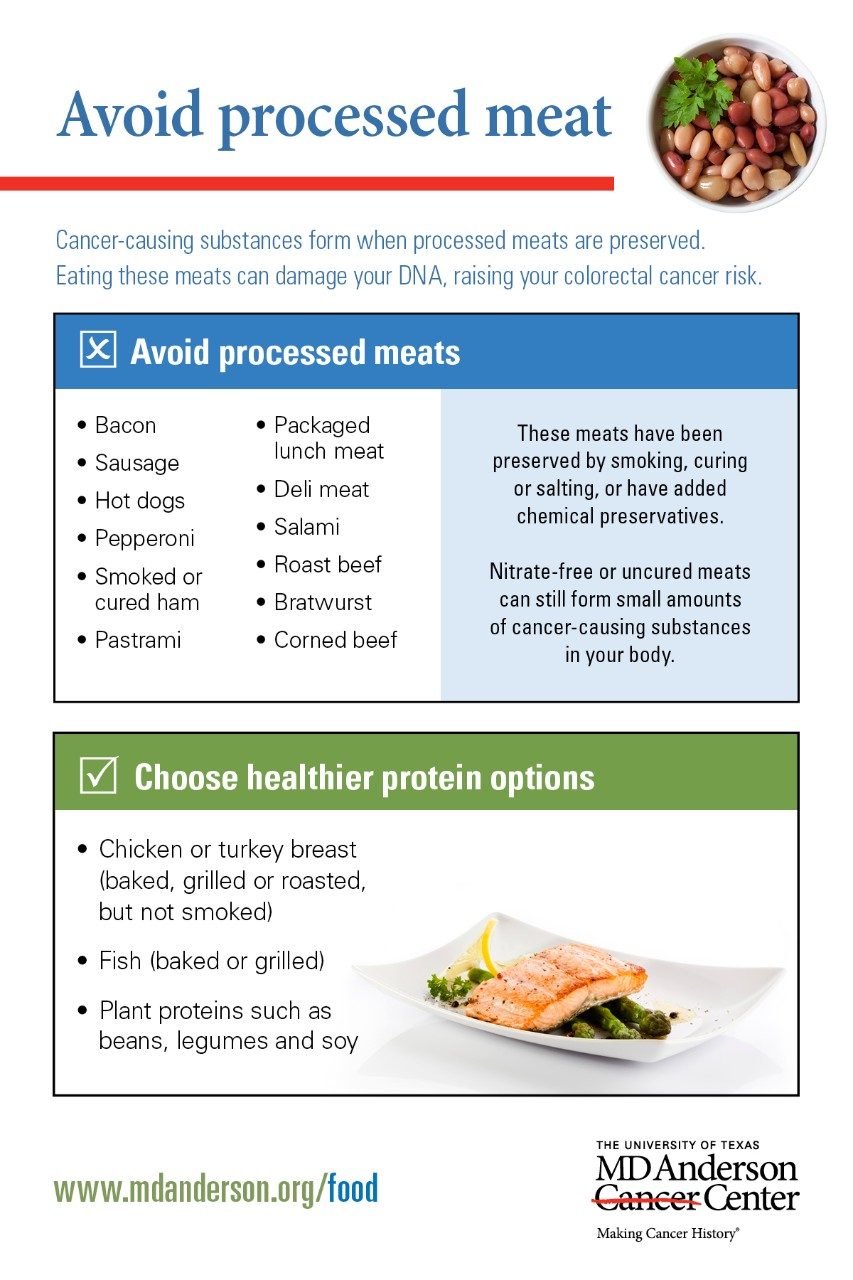Processed meat and cancer: What you need to know
Processed meats are meats that have been preserved by smoking or salting, curing or adding chemical preservatives. They include deli meats, bacon and hot dogs. Eating processed meats increases your cancer risk.

Processed meats are convenient, affordable and woven into our collective diet. For many, a turkey sandwich is a lunchtime fixture, bacon is a prized breakfast treat and cookouts wouldn't be the same without hotdogs on the grill
Unfortunately, when these processed meats are preserved, cancer-causing substances form.
“Research shows that eating processed meats like bacon and cold cuts can increase your chances for stomach and colorectal cancer,” says Lindsey Wohlford, employee wellness dietitian at MD Anderson Cancer Center.
So how much is too much? Will my daily turkey sandwich give me cancer?
There is no way to completely eliminate your risk of cancer. However, the American Institute of Cancer Research recommends avoiding processed meats. That means eat as little processed meat as possible. They are considered carcinogens and eating them increases your cancer risk.
So what falls into the category of processed meat? You may be surprised. Any meat that has been preserved by smoking, curing or salting is processed. And meats with added chemical preservatives are also processed.
Some processed meats include:
- Ham
- Sausage
- Hot dogs
- Pepperoni
- Beef jerky
- Deli meats, including roast beef and turkey
Why are processed meats a cancer risk?
Evidence has been accumulating over the years that processed meats cause cancer. There are three chemicals in particular that have been linked to colorectal cancer. One of these chemicals occurs naturally in meat. The others develop or are added as part of the process to produce these meats.
- Heme is a pigment found mostly in red meat
- Nitrates and nitrites are added to keep processed meat fresher longer
- Heterocyclic amines and polycyclic amines are produced when meat is cooked at high temperatures
All of these chemicals can damage the cells in the colon and rectum. As damage accumulates over time cancer risk greatly increases.
Tips to avoid processed meat
If processed meat products are part of your diet, you can take steps to reduce or eliminate them.
- Read the label. Check the ingredient list for words like nitrate, nitrite, cured or salted. If you spot these words, it’s a processed meat and should be avoided.
- Be an educated buyer. Even meats labeled “uncured” still can have nitrates and nitrites in them.
- Skip nitrate-free meats. These meats may have less nitrates and nitrites. But, they’re not nitrate-free. When you eat these foods labeled nitrate-free, your stomach actually turns some nitrates into nitrites. And some of these nitrites can then form cancer-causing substances in your body.
- Reduce portion sizes of processed meats and eat less frequently.
- Choose a plant-based diet most often and have some meatless days.
Think outside the box. Eating less processed meat is easier than you think. Here are some healthy swap tips to get you started.
- Add grilled chicken, hard-boiled egg, beans, tofu or flaked tuna to your salad instead of cubed deli meat.
- Order a grilled chicken or fish sandwich instead of a deli sandwich.
- Add vegetables to your omelet instead of bacon, ham or sausage.
Keeping a food log can help you be more mindful of just how much processed meat you are eating. Be sure to carry healthy substitutions like hummus and vegetables that can replace that deli sandwich. Once you become of aware of your eating habits and start choosing healthier foods, reducing and even eliminating processed meats from your diet will become easier.





